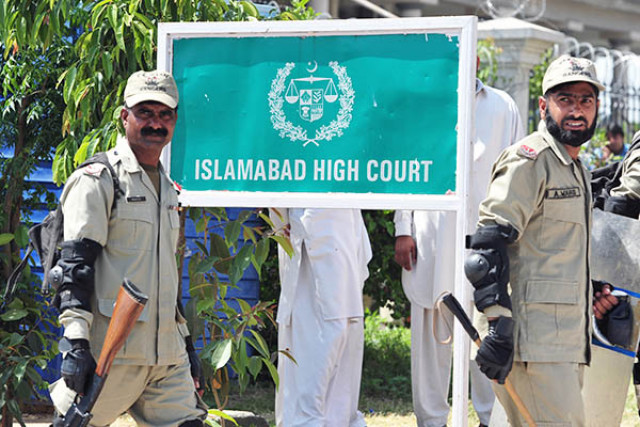ISLAMABAD:
The newly established Federal Constitutional Court (FCC) on Monday dismissed the intra-judicial appeals (ICA) filed by five judges of the Islamabad High Court (IHC) and the Karachi Bar Association (KBA) against the transfer of three judges to the IHC for non-prosecution.
However, the court granted time to lawyers representing the Lahore Bar Association (LBA) and the Lahore High Court Bar Association (LHCBA), as well as PTI founder Imran Khan’s lawyer, against the transfers, and adjourned the hearing sine die.
A six-member bench of the FCC headed by Justice Amin-ud-Din Khan heard the intra-judicial appeals against the decision upholding the transfers of Justice Sardar Sarfraz Dogar and other judges.
The bench also included Justice Hassan Azhar Rizvi, Justice Ali Baqar Najafi, Justice KK Agha Khan, Justice Rozi Khan Barrech and Justice Syed Arshad Hussain Shah.
On November 22, five IHC judges filed a petition with the FCC, requesting that their ICA in the judge transfer case be remanded and heard by the Supreme Court.
In their motion, the IHC judges raised serious and fundamental questions about the very legitimacy of the FCC. They argued that the calls were transferred to the FCC under the 27th Constitutional Amendment, but that the 27th Amendment itself is unconstitutional.
At the start of the hearing, the IHC judges’ lawyer, Munir A Malik, did not appear. In the absence of prosecution, the court rejected the appeals.
Similarly, Faisal Siddiqi, an advocate of the Karachi Bar Association and former president of the Islamabad Bar Association, was also absent, which also led to the rejection of their appeal.
Although Hamid Khan, the lawyer for the LBA and LHCBA, did not appear, his associate Ajmal Toor showed up and requested an adjournment. The court accepted the application and adjourned sine die the intra-judicial appeals related to the AMLA and LHCBA.
Idrees Ashraf, the PTI founder’s lawyer, appeared and argued that his client was imprisoned in Adiala jail and needed to get further instructions.
He said they had challenged the short-term order earlier and after detailed reasons were issued, they now had to file further submissions, for which a meeting with the client was essential.
He asked the court to issue directions allowing him to meet the PTI founder so that he could determine whether to withdraw the petition or challenge the decision with additional grounds. The lawyer also invoked Article 187, which pertains to complete justice, and argued for its application to seek directions from Imran.
The chief justice responded that only the court that convicted the former prime minister had the authority to issue such instructions, and that the FCC could not do so. Idrees Ashraf requested additional time, which the court granted. The FCC then adjourned the hearing indefinitely.
In February, the Law Ministry issued a notification regarding the transfer of Justice Sardar Muhammad Sarfraz Dogar, Justice Khadim Hussain Soomro and Justice Muhammad Asif, respectively, from the Lahore High Court, Sindh High Court and Balochistan High Court to the IHC.
Following this transfer, approved by the President, the IHC issued a new seniority list, listing Justice Dogar as a Senior Puisne Judge.
Five IHC judges, Justice Mohsin Akhtar Kayani, Justice Babar Sattar, Justice Sardar Ejaz Ishaq Khan, Justice Saman Rafat Imtiaz and Justice Tariq Mehmood Jahangiri filed representations against this seniority list. The then IHC Chief Justice Aamer Farooq rejected these representations.
The IHC judges and some other petitioners, including Imran Khan, challenged the ministry’s notification as well as the new seniority list in the Supreme Court, whose five-member Constitutional Bench (CB) heard the matter.
On June 19, the CB headed by Justice Muhammad Ali Mazhar declared that the transfer of the three judges was not unconstitutional, by a majority of 3-2.
The majority opinion was supported by Justice Mazhar, Justice Shahid Bilal and Justice Salahuddin Panhwar. However, Justice Naeem Akhtar Afghan and Shakeel Ahmad disagreed with the majority decision. The IHC judges filed an intra-judicial appeal against this order.




